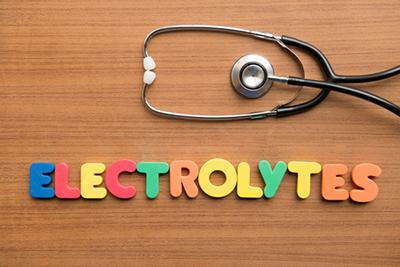
Electrolytes, which play an integral role in various physiological processes, refer to the essential minerals that carry an electric charge. An electrolyte disorder is a condition in which there is an imbalance in the levels of electrolytes in the body. For more information regarding the causes and symptoms of electrolyte disorder, contact the Iowa Kidney Physicians in Des Moines, IA.
What Is an Electrolyte Disorder?
Electrolyte disorders happen when an abnormal concentration of one (or several) electrolytes is in the bloodstream. These imbalances have the potential to cause significant health consequences.
Electrolyte imbalances can manifest as elevated (hyper) or low (hypo) concentrations of the primary electrolytes -
- Sodium– regulates blood pressure, nerve functioning, and fluid balance.
- Potassium– is important for heart health, nerve functioning, and muscle function.
- Magnesium– maintains proper blood glucose levels, bone health, and nerve/muscle function.
- Calcium– important for bone health, blood clotting, muscle contraction, and more.
- Chloride– is important for digestion and fluid balance.
The symptoms of an electrolyte disorder vary and are contingent on which electrolyte is out of balance and whether it is too low or elevated. Common symptoms may include the following–
- Weakness/muscle cramps
- Fatigue
- Irregular heartbeat
- Nausea/vomiting
- Confusion
- Seizures
Common Causes of Electrolyte Disorders
In addition to chronic diseases (like congestive heart failure or chronic kidney disease), which can disrupt electrolyte balances over time, the following represent the most common causes of an electrolyte disorder–
Dehydration
Losing fluids – from sweating, vomiting, or insufficient fluids- can cause an electrolyte imbalance. This is especially true for sodium and potassium.
Medications
Certain meds – particularly diuretics (a.k.a. water pills)- can potentially impact electrolyte levels.
Medical Disorders
Kidney Disorders
The kidneys, which filter excess electrolytes from the blood, are critical in maintaining an appropriate electrolyte balance. Kidney dysfunction may create an electrolyte imbalance.
Hormonal Disorders
Hormonal imbalances that impact the thyroid or adrenal glands may affect the body’s electrolyte levels.
Gastrointestinal Disorders
Conditions that cause malabsorption or diarrhea may affect the body’s electrolyte levels.
Eating Disorders
Anorexia or bulimia nervosa causes malnutrition and purging that may disrupt normal electrolyte levels.
Diagnosing an imbalance in electrolytes usually includes a blood test to measure the concentration of electrolytes in the bloodstream. Treatment seeks to correct the cause of the imbalance and may consist of–
- Dietary modifications
- Medications
- Electrolyte Replacement by IV and more
Contact Des Moines, IA’s Leading Kidney Physicians
If you suspect an electrolyte imbalance or experience related symptoms, it is essential to seek prompt medical attention to prevent complications. With two Des Moines, IA locations, the Iowa Kidney Physicians is conveniently located to help manage your condition. Contact our staff at (515) 336-6557 (Methodist Plaza) or (515) 243-3161 (Riverpoint).
